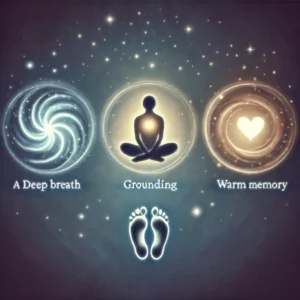
Letter to the future self.
A lastingly effective lifeline in acute grief and similar crisis situations is writing down thoughts and the emotions associated with them.
As an active reader and writer, writing has always been an incredible resource for me. In many crisis and disaster situations followed by grief, I noticed how my stress levels significantly decreased. This made the sadness more bearable and the situation more controllable.By putting my thoughts into writing, I was able to break acute spirals of rumination. I also gently integrated seemingly endless burdensome emotions by verbally processing them.I have condensed these experiences into a fast-acting technique, which I would now like to introduce to you as a lifebuoy.
The letter to yourself.
This technique involves writing a letter addressed to your future self. In this letter you can write down all your wishes, hopes or goals that you have for your future life. Regardless of whether they are currently achievable or not. It's okay to just fantasize! But you can also write down fears, anxieties and current failures that you want to learn from in this letter for your future self.
You have complete freedom over what this letter should contain. The only important thing is that you share with your future self what is currently very close to your heart. There is no right or wrong here. Everything you want to express in this moment matters.Once you’ve finished writing, you can seal the letter in an envelope and keep it in a safe place. When the time is right, or the chosen moment in the future has arrived, you can read the letter again and reflect on it.
Three power questions to strengthen your resilience in grief.
Resilience describes the psychological resistance or ability to regenerate. Resilience is a valuable resource that you can use to cope with grief and as a lifeline.
Your personal resilience depends on various factors, including the experiences you have already had with grief and loss. Perhaps you have faced losses and crises in the past that you managed to overcome. Through this, you have learned that it is possible to find ways out of grief.The exciting thing is: no matter where you are right now, you can consciously train your resilience. It’s absolutely okay wherever you currently stand. Because the first step is the most important one — that you are already working on your resilience by taking hold of this lifebuoy.
The following three power questions – which I will now present to you – can help you to consciously and sustainably strengthen your mental health during grief.

What is good for me?
What makes you happy? In grief and crisis, we often forget what is actually good for us and gives us energy. Also think about: What did you do well in the past (in a similar situation - e.g. sports, making music, painting, walking in nature, meditation)?
Who is good for me?
Who is the person you go to when you are really down? With whom can you speak openly? Maybe they are people who are usually in the “second row” but are still there for you.
What am I doing what I'm doing for?
This is about your values. What values do you live by? What is important to you? Also think about intangible values that enrich you from within and are an anchor for you, no matter what happens on the outside, e.g.
- Gratitude
- Love
- Appreciation
- Liveliness
- Personal responsibility

Three-step method.
This method takes only a few minutes and is designed to be easily applicable even in very intense moments. Each step is consciously tailored to give you a short break where you can allow your feelings space without being overwhelmed by them. The exercises are designed to quickly have a calming effect by using breathing, grounding, and memory to provide you with safety and comfort.Even in times of strong emotional turmoil, you can use this Three-Step-Method to pause and gather yourself without needing lengthy preparations. The three steps help you reconnect with yourself and calm your mind. This way, in moments of grief, you can experience a sense of inner stability and peace that gives you the strength to cope with your feelings.Breathe deeply.
Take three deep breaths, very slowly. Breathe in deeply through your nose, pause briefly, and breathe out slowly through your mouth. Focus completely on your breath - this will help you to center yourself and to ease the intense feelings for a moment.
Feel the ground beneath your feet.
Sit or stand and focus for a few seconds on how your feet touch the floor. This grounding technique helps you arrive in the moment and gain a feeling of stability.
Bring a memory into the heart.
Think of a nice, simple memory of the person who died - for example, a shared laugh or a warm moment. Remind yourself that this moment will always be a part of you and give yourself a little smile.

